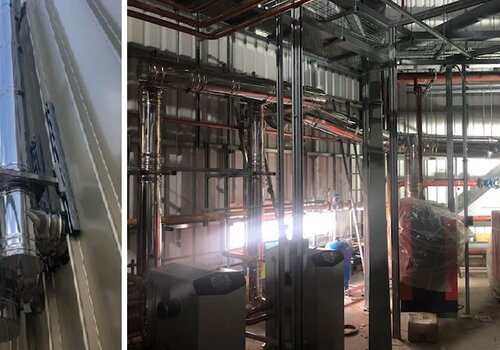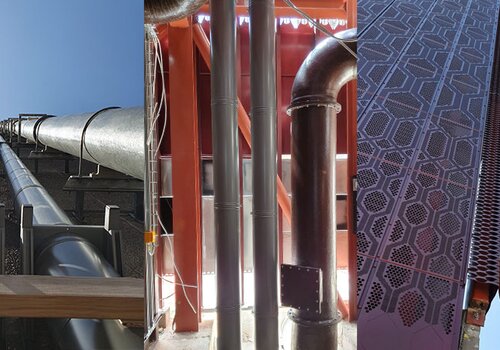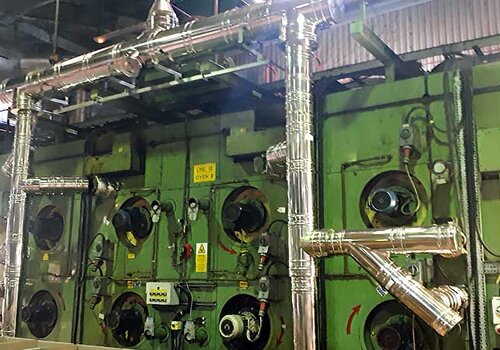Flue first
Why architects and contractors need to tackle the chimney blind spot in data centre construction.
Mind the blind chimney spot
Chimneys are a critical part of building a resilient data centre.They allow the back- up generators to function properly in the event of a mains outage, keeping servers powered and important digital services available to the millions of users seeking to access them.But flues are not just important to the building owner or operator; they also have a direct impact on the construction of new data halls.There are hundreds of contractors involved in a typical project, and each will require certain phases to complete before they can begin work on site. Leaving flues to the last moment – as some do – significantly raises the chance of errors just as the building is nearing completion.This will not only delay sign off and payment but will also damage the developer’s standing in a market where work is often awarded on recommendation.This oversight is
the ‘chimney blind spot’.
Flues should be considered central to any robust uptime strategy and treated as an important step in guaranteeing availability more than 99% of the time. Data centre operators, for example, can only achieve Tier IV – the highest classification from the Uptime Institute – if a facility demonstrates a sufficient degree of ‘fault tolerance’.This means the effects of a power cut, equipment failure or interruption to the distribution path have to be managed long before any IT infrastructure is taken offline or, worse still, damaged.
It’s not difficult to see where chimneys fit in with the idea of fault tolerance. They will expel the back-up generator’s fumes and ensure any heat created is directed upwards, in turn lowering the risk of unexpected failure when on-site power is required. In this sense, they are part of the first line of defence when the mains are cut.
"Flue first" mindset
Despite this link, flues are often treated as an afterthought during the design and construction phase of a new data centre. Some see them as a specialism – which often leads to delayed installation or even a total refit later on – while others choose to keep costs low by opting for the cheapest product.This is a mistake because a facility will only be as resilient as its weakest point, regardless of whether acomponent is used every day or only when an emergency hits.
Operators ultimately need to know their reserve system is going to work when it’s needed most.
Using the insights of Schiedel’s team of experts, this paper seeks to remedy industry’s chimney blind spot by promoting a ‘flue first’ mindset. It looks at the different
industry factors that now make correct specification more important than before, the key points and timings for contractors and architects to consider, and a clearer understanding of what a successful installation looks like.
In doing so, Schiedel can better support those involved with data centre development during the most critical stages of a build. Setting out the argument in this way will also help to standardise the use of flues in data centres – especially important given the sector’s continued growth.
Correct specification
Flues perform a simple task in data centres. They are pieces of pipework or duct that expel gases and hot air from a generator’s combustion chamber to the open air outside. But this simplicity underplays their critical role when things go awry.If the chimneys fail, there’s a high chance the on- site power will overheat or malfunction. This leaves servers without power in the event of a mains cut, which is often prohibitively expensive.
Research has shown the cost incurred by major data centre outages continues to rise, with some estimates placing the figure at £4,500 per minute. However, this is based on data from 2019, so the number has likely risen further in the intervening years.
But it’s not just during operation that chimneys need to be considered.They also have a direct impact on the progression of a new build.
Failure to specify the correct product at the right time will usually lead to delays, either during construction itself or when commissioning is taking place. Delays are common on most construction sites, though they are particularly troublesome for data centre projects – to such a degree, in fact, that the Uptime Institute recommends some businesses write penalty clauses into contracts before work begins.
These can be substantial when compared with the original awarded contract.
The cost of outages continues to rise, with some estimates placing the figure at £4,500 per minute.
There are also retention clauses to consider, which typically range between 10% and 20% of the contract’s total value.These are included for claims made against installed products. While standard practice, any questions around product quality and suitability will typically result in payments being withheld or charges applied.
“It’s not uncommon for disputes to take a large percentage of a contractor’s profit margin, so it’s essential to choose a reliable, well-designed flue system installed by an expert subcontractor. This will lower the chances of losses that are ultimately avoidable.”
Beyond this, there are also reputations on the line. Mistakes could have repercussions that last long after any remedial work has taken place. Operators will be less inclined to employ a business again if the product originally specified is incorrect and in need of a refit.
This creates added hassle and expense that is avoidable when the appropriate solution is chosen first time. Poorly designed flues can also pose a safety hazard to staff and the general public if they are unable to expel exhaust fumes properly – this issue is particularly important for builds close to built-up areas.
Huge demand for Data Centres
New data centre construction projects show no sign of slowing down. Construction consultancy BCS interviewed over 3,000 data centre professionals in 2022, with 88% of surveyed developers and investors expecting to increase the amount of technical data centre area they own over the next 12 months.This follows on from CBRE’s forecast, which shows demand for data centres to remain at a near all-time high.
GRID STRAIN
Data centres take a huge amount of electricity from the grid.Yet national infrastructure in key markets, like London and Dublin, are known to be struggling with current demand. Some journalists have even noted the grid’s ‘fragility’ amid a surge of new facilities around major cities, increasing the threat of outages and reliance on back-up generators.6
SCRUTINY
Data centres are assessed on the amount of time they are available to users. Uptime is not just a measure of performance but innately tied to the bottom line.The more reliable a facility is, the longer a product or service remains accessible to its customers. That goes for both hyperscale facilities and colocation providers that rent out server racks. Cutting corners, especially in areas like emergency response, will eventually harm a data centre’s ability to remain competitive in a market that’s
differentiated by the smallest of percentages.
LONGER OUTAGES
The number of power cuts in data centres remains stable, but those that do occur are getting longer and more expensive.
Research from the Uptime Institute showed nearly 30% of outages in 2021 lasted more than 24 hours, up from just 8% four years earlier. Over 60% of these failures also cost at least £81,000, up from 39% in 2019. Poorly designed flues will increase the severity of these issues, especially when it damages reserve on-site power.
LACK OF GUIDANCE
The Uptime Institute’s tier classification and ANSI/BICSI 002-2019 offer guidance for data centre design but little, if any, attention is given to the specification of flues for back-up power.This increases the chance of error or bad product selection.
Introducing flue at the right time
This is key given the penalty clauses that can be issued when a project is delayed. However, the tendency for contractors to leave the process until the tender stage is an error, as the most successful projects invariably seek specialist opinion much earlier on (see section III).This approach provides more time but it also anticipates technical challenges long before the customer takes ownership.As a chimney specialist that has worked extensively in the data centre market, Schiedel advocates a ‘critical path’ method. Adhering to this process not only eliminates issues before they affect a build, but also ensures expertise is introduced at the most effective point.
“The total cost for a data centre project typically runs into the millions, with fitted assets that cost hundreds of thousands, so it makes little sense to leave a relatively inexpensive component to the last moment. “
Delays mean penalties but they can also threaten sensitive IT equipment when it has to be placed into storage.
More related content

News
Schiedel ICS Flue System at Boeing in Sheffield.
Another major name was added to the Schiedel List of Who’s Who, when we completed a project for Boeing in Sheffield.

News
Metaloterm system in Bunhill 2 Energy Centre.
Another innovative installation using Schiedel Metaloterm took place in London. Airtherm used Schiedel Metaloterm MF on a “Worlds First” pro...

News
Flues for a Manifold System.
SGL in Muir of Ord, in Scotland, make fibres and materials for composites. They develop tailored and sustainable solutions for the mega tren...






















